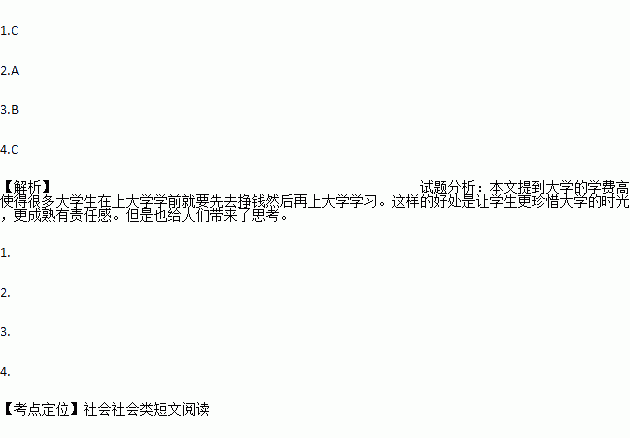题目内容
More student than ever before are taking a gap-year (间隔年)before going to university.It used to be called the “year off” between school and university.The gap-year phenomenon originated(起源) with the months left over to Oxbridge applicants between entrance exams in November and the start of the next academic year.
This year, 25,310 students who have accepted places in higher education institutions have put off their entry until next year, according to statistics on university entrance provide d by University and College Admissions Service (UCAS) .
d by University and College Admissions Service (UCAS) .
That is a record 14.7% increase in the number of students taking a gap year. Tony Higgins from UCAS said that the statistics are good news for everyone in higher education. “Students who take a well-planned year out are more likely to be satisfied with, and complete, their chosen course. Students who take a gap year are often more mature and responsible,” he said.
But not everyone is happy. Owain James, the president of the National Union of Students(NUS), argued that the increase is evidence of student had ship – young people are being forced into earning money before finishing their education. “New students are now aware that they are likely to leave university up to £15,000 in debt. It is not surprising that more and More students are taking a gap year to earn money to support their study for the degree.NUS statistics show that over 40% of students are forced to work during term time and the figure increases to 90% during vacation periods,”he said.
1.What do we learn about the gap year from the text?
A. It is flexible in length.
B. It is a time for relaxation.
C. It is increasingly popular.
D. It is required by universities.
2.According to Tony Higgins, students taking a gap year______.
A. are better prepared for college studies
B. know a lot more about their future jobs
C. are more likely to leave university in debt
D. have a better chance to enter top universities
3.How does Owain James feel about the gap-year phenomenon?
A. He's puzzled. B. He's worried.
C. He's surprised. D. He's annoyed.
4.What would most students do on their vacation according to NUS statistics?
A. Attend additional courses. B. Make plans for the new term.
C. Earn money for their education. D. Prepare for their graduate studies.

